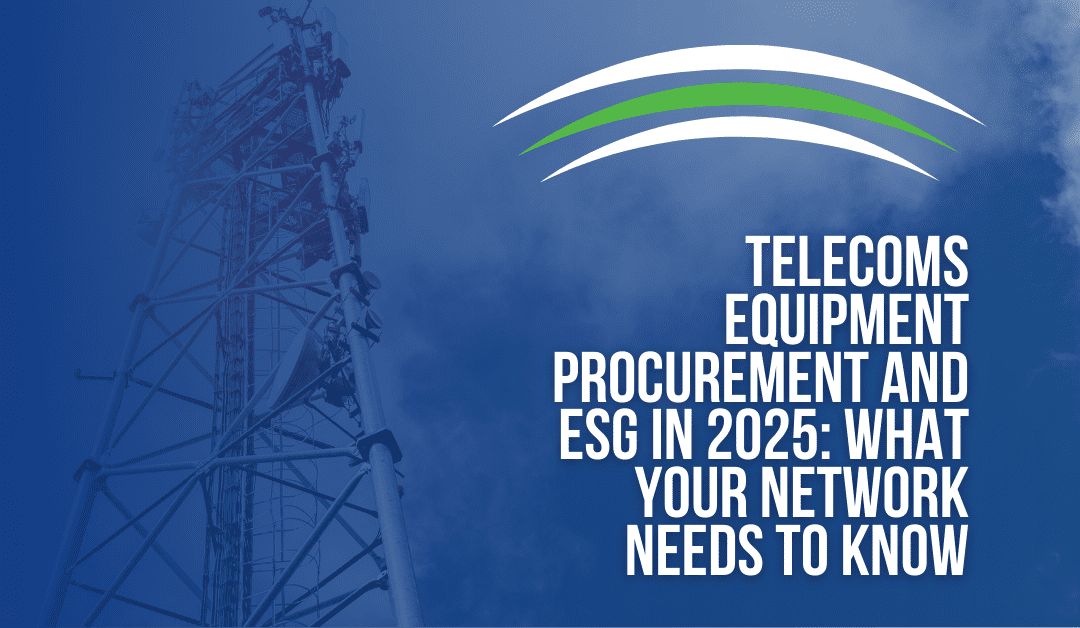Telecoms Equipment Procurement and ESG: what your network needs to know (and do!)
ESG (which stands for Environmental, Social and Governance) is a framework gaining more and more traction in the telecoms industry. It’s no longer enough for companies to solely focus on economic output and their operational processes – they now have to consider how their work impacts people and the environment as well.
In 2024, 90% of S&P 500 Index companies generated their own ESG reports, and 83% of consumers believe businesses should be more transparent about their ESG. This highlights the growing role of ESG in companies, regardless of their size, location, and sector they operate in.
But what does ESG actually mean for equipment management within the telecoms industry, and what is your network doing about it? That’s what this piece is going to answer, to highlight how your network can demonstrate a commitment beyond just profit and make meaningful change in the areas of Environment, Social and Governance.
Environmental
It goes without saying that the amount of energy needed to operate data centres and network infrastructure has a huge impact on the environment.
Add into that the exponential growth of data usage, brought about by things like the introduction of 5G, and it’s clear to see why more needs to be done by networks to protect the environment.
And this number is only expected to rise, and rise fast.
Despite all this, the major telecom networks have set net-zero carbon targets for 2040-2050. One of the key ways they’re looking to achieve this is through digitalisation.
Digitalisation in the telecoms industry involves networks enabling their customers to reduce their own CO2 emissions, by moving certain processes online and making them more efficient.
By shifting operations to the cloud, incorporating AI/automation, and creating faster and more reliable networks, the telecoms industry is helping other sectors streamline their own operations and cut down on CO2 emissions.
Another of the environmental issues facing the telecoms industry is the treatment of old equipment.
When legacy equipment is seen to be obsolete, it’s often just discarded into landfills. This not only creates huge landfills (which is a problem in and of itself), but it also represents a colossal waste of valuable resources – there is almost always value to be extracted from old equipment, yet it is so rarely capitalised on.
Getting rid of old equipment creates a demand for new equipment to replace it, which of course causes CO2 emissions and damages the environment further.
Social
Telecoms’ main role within the Social pillar of the ESG model is to improve access to networks and end the ‘digital divide.’
The ‘digital divide’ refers to the fact that some countries, and regions within certain countries, don’t have the same access to technology that other places do. By committing to ESG, networks should look to provide equal access to technology like the internet, regardless of a person’s location, socio-economic standing and demographic.
Rural areas in particular suffer from the digital divide, so networks should seek to develop connectivity services there as a matter of high importance.
The other key Social area for networks to target is the treatment of their staff. Ensuring human rights are always adhered to has been the focus for lots of operators for many years now, but it’s time that the rest followed suit.
The workplace should be an environment where conditions are fair and human rights standards are strictly followed at all times. Promoting local employment is another way networks can meet ESG requirements as well.
Governance
The final pillar of the ESG framework networks should incorporate into their operations is Governance.
The main area of Governance for networks to prioritise is data protection. Given how much consumer data is now stored by networks, it’s imperative that it’s done so securely and in the right way.
A public scandal where consumer data gets leaked can cause irreversible damage to a network’s image, possibly leading to regulatory closures and projects being delayed and even cancelled.
By committing to ESG-based initiatives, networks can prevent these controversies from occurring.
To ensure ESG practices are properly implemented and turned into a reality, networks need strong governance and full transparency with everything they do. Without it, they risk losing the accountability that is a key driver in positive change.
How to put ESG into practice in telecoms procurement
Now you know why ESG is so important, how do you do it?
It may seem like adhering to all these different principles is a challenge, but it’s actually a lot easier than you’d think.
By partnering with Shields, your network is given exclusive access to our MarketPlace – the world’s largest inventory of renewed network equipment.
By taking old equipment and refurbishing and repurposing it, we give it a new lease of life. It doesn’t just end up in a landfill, but instead becomes part of another network’s inventory (and for much cheaper than if they were buying brand-new from the OEM).
Our renewed equipment is literally 10x more reliable than OEM equivalents. This cuts down on your long-term costs and the environmental burden of constantly replacing and disposing of equipment. We also extract precious materials from any equipment that can’t be repurposed, and transfer the extra revenue back to you.
On top of that, your lead times are reduced as we always have stock ready to go, and our MarketPlace provides a centralised record to view your entire global inventory at once, making the transferring of equipment within your own network much easier.
MarketPlace goes beyond ticking boxes (though it does a good job at that too). We can help your network create operational processes that genuinely take environmental, social and governing concerns seriously, creating a better present and a better future for everyone.
In summary, here are the benefits of partnering with Shields when prioritising telecoms ESG requirements:
– You’re given exclusive access to the world’s largest inventory of renewed network equipment.
– Our equipment is cheaper and much more reliable than OEM equivalents, cutting down on your short and long-term costs.
– Renewed equipment is better for the environment.
– Lead times are reduced.
– You’re given a centralised record to view your entire global inventory at once.
– Your network can make extra money.
Benefits of prioritising ESG in telecoms procurement
As well as the obvious positives of helping the environment, providing technological access for more communities, and properly securing data, there are a number of other rewards to be reaped for networks that prioritise ESG in their equipment procurement.
The main benefit is that the network becomes a more attractive proposition.
This ‘conscious consumerism’ is largely due to environmental concerns, and the desire to purchase products that last a long time. As outlined, our MarketPlace helps achieve both those points.
Building yourself as an ESG-committed network now will have lots of long-term benefits, as conscious consumers view your network as the place-to-go. This gives you a competitive advantage, while contributing to long-term sustainability.
For a more detailed explanation of why brand-building is so important, have a read of this blog where we talk about the similarities between telecoms and the fashion industry.
And it’s not just consumers who are attracted to ESG-conscious networks.
Investors are much more likely to choose a network with clear green targets, that enforces the highest workplace standards, and which has strong governance in place.
Another benefit for networks that prioritise ESG is that they’re much less likely to run into regulatory and legal problems. All over the world, there are stricter rules coming into force that demand commitment to the environment, workers, data privacy, and consumers. By adopting ESG into your day-to-day practices, you won’t accrue penalties and have your brand’s image tarnished.
To recap, here are those benefits of prioritising ESG in telecoms procurement:
– Environment is looked after.
– Technological access is provided to more communities.
– Staff are treated properly.
– Data is properly stored and secured.
– Your brand is built – good for attracting consumers and investors.
– You’re less likely to run into regulatory and legal problems.
What you need to do next
If you’re ready to take ESG more seriously and put your network in the best position moving forward, click below to book a MarketPlace demo.

